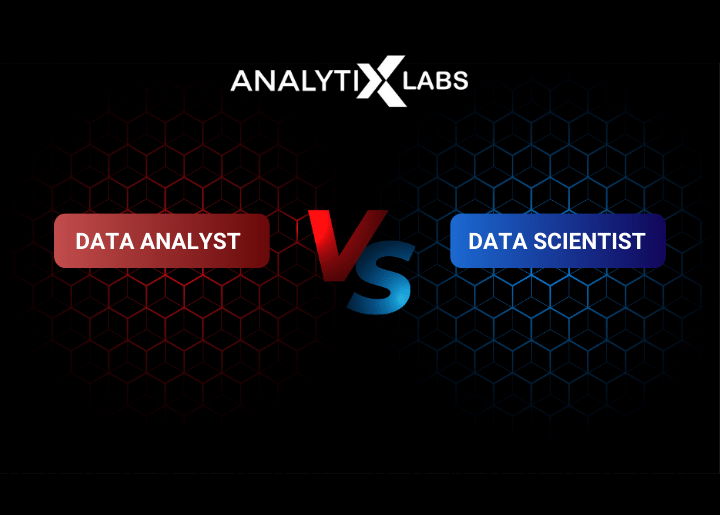Data analysts and data scientists are highly demanded roles that are often confused. While they share many similarities, there is a crucial difference between them. Both disciplines leverage data for insights, but data science often utilizes data to construct models predicting future events. In contrast, data analytics focuses primarily on using historical data to inform present actions.
The global Data Science market is projected to reach $103 billion by 2027, with India emerging as a significant contributor.
Data science encompasses data analytics, machine learning, and data engineering. Data scientists utilize statistical and computational techniques to extract insights from data, develop prediction models, and devise innovative algorithms. Analyzing data to gain knowledge and inform business decisions is termed data analytics.
With this article, we will learn some differences between a data analyst and a data scientist. We will also examine the differences between data analytics and data science regarding qualifications, salary, skills, and career scope.
What does a Data Analyst do?
A skilled data analyst transforms data into information to derive insights and make business decisions. They collect, organize, and analyze large datasets to identify patterns and trends. They use various tools, such as SQL, Excel, and Tableau, to extract insights from data and present them meaningfully. Data analysts also create reports and visualizations to communicate their findings to stakeholders.
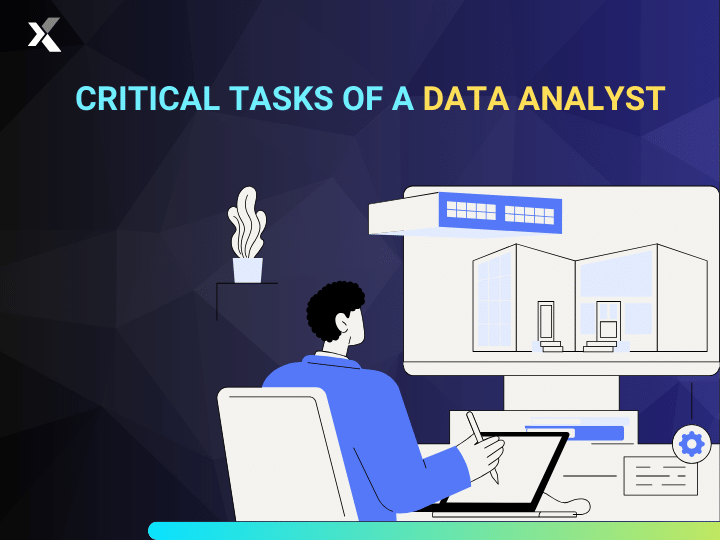
The critical tasks performed by data analysts are:
- Employ automated techniques to retrieve data from both primary and secondary sources.
- Rectify inaccurate data, address code issues, and handle other pertinent concerns.
- Establish and oversee data systems and databases, restructuring data to enhance readability.
- Analyse and evaluate the significance and quality of the data.
- Scrutinize reports and performance indicators, filter data, and rectify code issues.
- Apply statistical methods for diagnosis and prediction, investigating patterns and trends in extensive, intricate data sets.
- Attribute numerical values to critical business functions for ongoing performance evaluation and comparison.
- Scrutinize regional, national, and international trends influencing the company and the sector.
- Leverage pertinent data to craft management reports highlighting trends, patterns, and forecasts.
- Collaborate with managers, engineers, and programmers to formulate data governance plans, suggest system changes, and identify opportunities for process enhancement.
- Produce conclusive analysis reports to facilitate stakeholder understanding of the data analysis process and empower informed decisions based on diverse facts and trends.
What does a Data Scientist do?
Data scientists combine technical skills and business acumen to gain insights from data and drive decision-making processes. They manipulate and analyze large datasets using Python, R, and Hadoop. Their strong programming skills allow them to develop algorithms and predictive models.
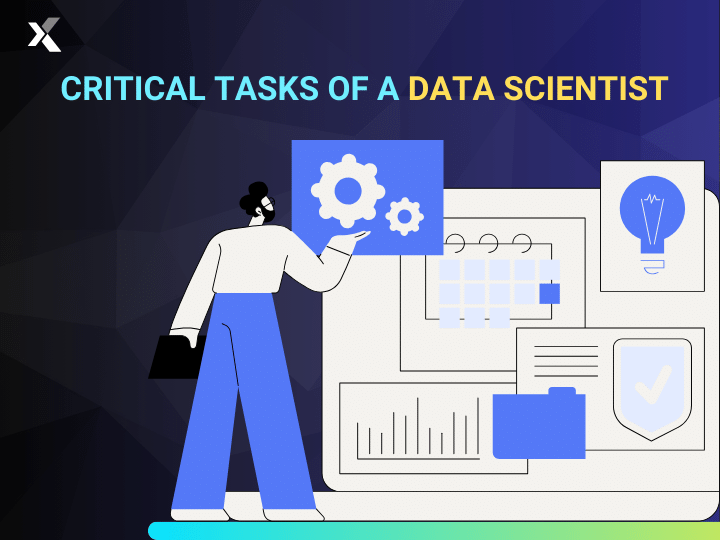
The critical tasks performed by data scientists are:
- Identify and define new business opportunities using advanced machine learning techniques and predictive modeling.
- Clean, organize, and preprocess large datasets to prepare them for analysis.
- Use statistical methods to create algorithms for predictive modelling and data mining.
- Develop visualizations and dashboards to communicate insights to stakeholders.
- Collaborate with cross-functional teams to identify areas where data science can drive business value.
- Analyze and adjust predictive models continuously to ensure they are performing as expected.
- Find insights from unstructured data sources such as social media or customer reviews using natural language processing (NLP).
- Stay up-to-date with the latest trends and advancements in data science, incorporating them into current processes to improve efficiency and accuracy.
After learning the tasks of a data analyst and scientist, it’s important to begin mastering the required skills. For this, you can check out our tailor-made courses-
Explore our signature Data Science and Analytics courses that cover the most important industry-relevant tools and prepare you for real-time challenges. Enroll and take a step towards transforming your career today. We also have comprehensive and industry-relevant courses in machine learning, AI engineering, and Deep Learning. Explore our wide range of courses. P.S. Check out our upcoming batches or book a free demo with us. Also, check out our exclusive enrollment offers
Data Analyst vs Data Scientist – Learn Key Differences
The most significant contrast between a data analyst and a data scientist is their approach to decision-making. Let’s compare data scientist vs data analyst:
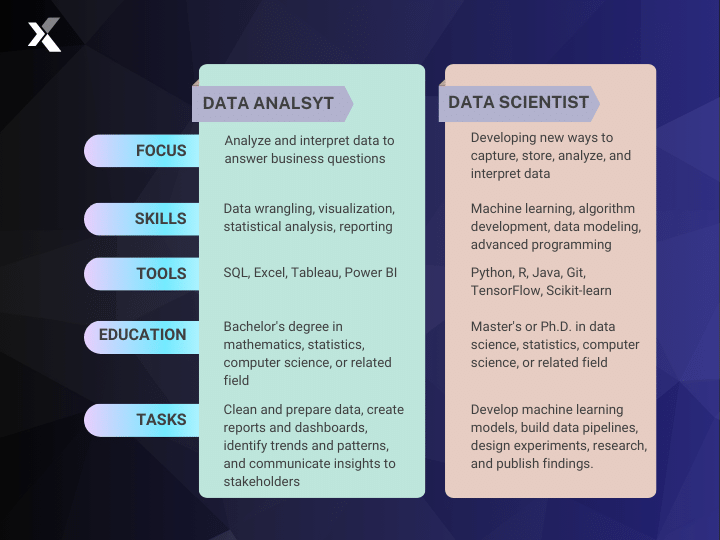
Data Analyst Vs Data Scientist: Education Qualifications
Data analysts and data scientists require technical skills and business acumen to succeed. However, comparing data scientist vs data analyst qualifications shows a difference between data analyst and data science eligibility.
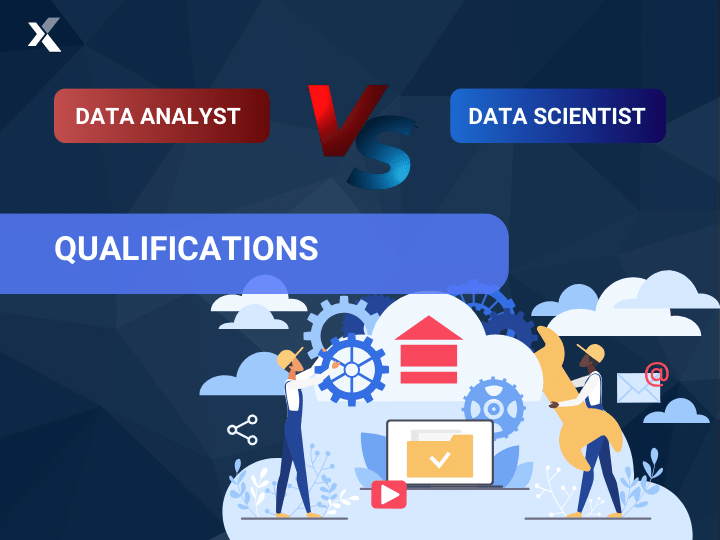
Qualifications of Data Analyst
- This position requires a solid computer science, mathematics, and statistics background and proficiency with Python and SQL.
- Some employers value practical experience and portfolios more than the equivalent of a bachelor’s degree.
- Entry-level experience as a data analyst helps showcase your skills in the competitive data science field.
- Professional certificates or relevant courses strengthen your resume and demonstrate additional expertise.
Qualifications for a Data Scientist
- A Master’s or Ph.D. in data science, statistics, computer science, or a related field is required.
- Knowledge of programming languages like R, Java, and C++ is essential.
- Understanding machine learning techniques and tools such as TensorFlow, Scikit-learn, and Hadoop is highly valued.
- Experience in data visualization, statistical analysis, and predictive modeling is also necessary.
- Industry-specific knowledge and business acumen are also valuable qualifications for a data scientist.
Data Analyst Vs Data Scientist: Explore Job Positions
Regarding career advancement opportunities, data analysts may have a more limited scope than data scientists.
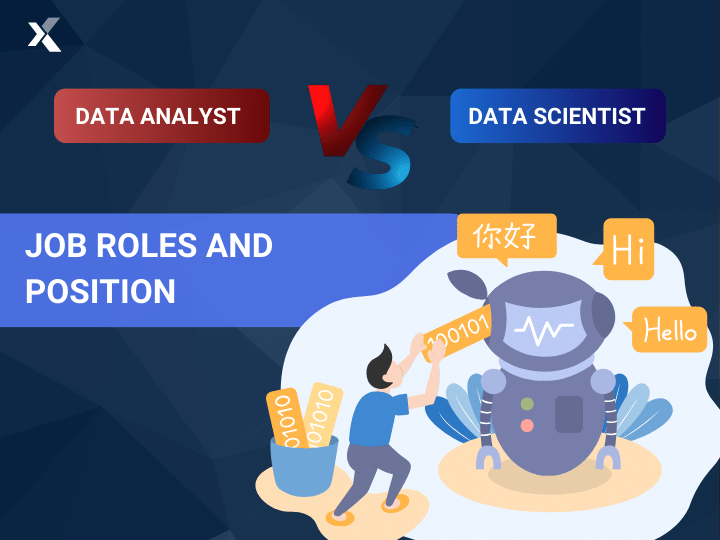
A data analyst’s typical career trajectory commences with an entry-level role as a research assistant or data entry clerk. They then progress to roles such as a junior data analyst or business intelligence analyst. With accumulated experience and expertise, they may advance to senior data analyst positions or leadership roles such as data architect or business analyst.
Junior data scientists or research assistants typically occupy the initial roles in the data science field, while senior data scientists and data scientists represent higher-level positions. With increasing experience, they specialize in areas like big data and machine learning, enabling them to take on roles such as directors of data science or machine learning engineers. Continuous skill improvement and ongoing education are imperative for career advancement.
Data Analyst Vs Data Scientist: Salary Range
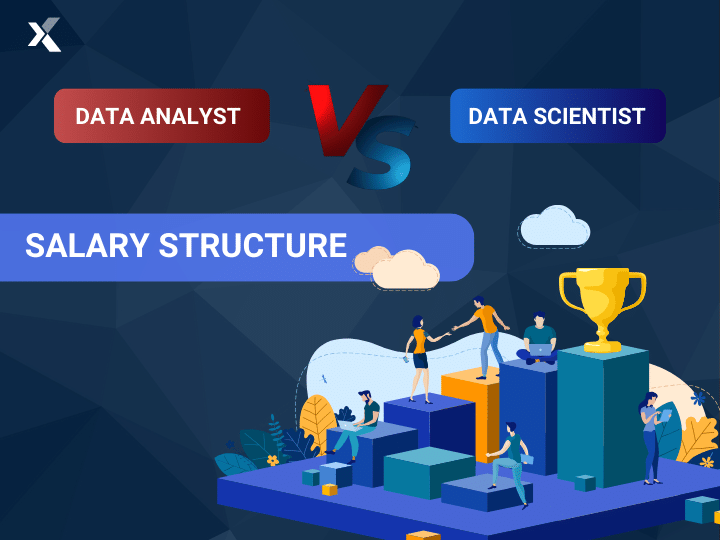
The difference between salary ranges for data scientists and data analysts is one of the most commonly discussed topics in the data industry. According to Glassdoor, the average pay for a senior data analyst in the US is roughly 97K USD.
In contrast, the average salary of a data analyst is between 65K and 70K USD. In India, a Senior Data Analyst usually earns approximately ten lakhs annually, whereas a Data Analyst typically makes six lacs.
The usual salary for a data scientist in the US is about 120K USD, while the salary for a senior data scientist is about 145K USD. Ambition Box estimates that the average salary for a Data Scientist in India is roughly 10.5 LPA, while a Senior Data Scientist in India makes about 20.5 LPA.
Also read: Data Science Salary Report 2023
Data Analyst Vs. Data Scientist: Essential Skills to Master
Another topic for debate is the skill difference between data analysts and data scientists. While there are some overlapping skills between these two roles, they also have distinct duties requiring varying capabilities.
Data Analyst Skills
- Experience in database administration & visualization, statistical analysis, data warehousing, data mining, data modeling, and data analysis.
- Knowledge of SQL and Excel databases.
- Adept in utilizing various technologies, including Power BI, Tableau, and SAS.
- Skilled in Python or R programming.
- Proficient in the visualization of data.
- Outstanding critical thinkers and problem solvers.
Also read:
Data Scientist Skills
- Skilled in programming, predictive modeling, machine learning, mathematics, and statistics.
- Competent in multivariate calculus, linear algebra, and probability and statistics.
- Competent in R, Python, Java, Scala, Julia, SQL, and MATLAB computer languages.
- Proficient in machine learning, data wrangling, and database administration.
- Knowledge of utilizing Big Data technologies such as Hadoop, Apache Spark, etc.
Also read:
Career Scope for a Data Analyst
The demand for skilled data analysts has significantly increased in recent years. The Bureau of Labor Statistics (BLS) projects that demand will rise 11 times the average rate by 2032.
Data analysis is widely used in various industries, such as finance, healthcare, retail, and technology.
Some of the key roles that data analysts can take up in different industries include:
- Business Analyst: Data analysis is crucial in understanding customer behavior and market trends to identify growth opportunities. Data analysts can take up a role that involves analyzing business data to provide insights and recommendations for business strategy and decision-making.
- Market Research Analyst: Market research is an essential aspect of any business. Data analysts can help gather and analyze market data to know consumer behavior, preferences, and trends, aiding in product development and devising marketing strategies.
- Healthcare Data Analyst: In the healthcare industry, data analysts help to identify patterns and trends in patient data. The insights can be used for disease prevention, diagnosis, and treatment.
- Financial Analyst: Financial institutions rely heavily on data analysis to make sound investment decisions. A data analyst can choose a career as a financial analyst, which involves analyzing market trends, economic factors, and company financials to provide recommendations.
- Data Scientist: As data is increasingly used in decision-making, the scope of a data analyst’s career gets wider with experience. A highly skilled analyst can also work as a data scientist. They can apply advanced data analysis techniques and tools to solve complex business problems. The role also requires a strong understanding of programming, statistics, and machine learning.
In addition to these industry-specific roles, data analysts can find job opportunities in consulting firms, government agencies, and research institutions.
Also read: Top Puzzle-Questions Asked in Business Analyst Interview – With Solutions [2024 Edition]
Career Scope for a Data Scientist
Data science is a rapidly growing field that has gained immense popularity recently. According to BLS, the employment scope for data scientists will increase by 35% from 2022 to 2032.
Some of the key roles that a data scientist can take up include:
- Data Engineer: A data engineer builds and maintains the infrastructure that is required to analyze data. They work closely with data scientists to design databases, pipelines, and other systems for storing and processing large amounts of data.
- Data Analyst: Data analysts can also transition into the role of a data scientist as they gain experience. They must learn to use advanced tools and techniques to analyze data and communicate insights to stakeholders.
- Machine Learning Engineer: Machine learning engineers develop and deploy ML models that can make predictions or decisions based on data. Data scientists can learn machine learning to take up tasks to optimize and improve these models.
- Data Science Manager: With experience, data scientists can take up managerial roles, leading a team of data analysts and engineers. They are responsible for setting goals, managing projects, and ensuring the team works effectively.
Apart from these roles, data scientists also have the opportunity to work in various industries such as finance, healthcare, retail, and technology. They also have a job scope in consulting firms, startups, and government agencies.
Conclusion
The comparison of data analyst and data scientist shows that both have promising career scopes and growing demand across industries. With the increasing use of data in decision-making processes, these roles are expected to continue to be in high demand for years.
Professionals will have more opportunities as the data analyst data science field evolves and new technologies emerge. Data science analysts can also explore the field and widen their expertise to advance their careers and significantly impact the world of data.
Frequently Asked Questions
-
Which is better, a data scientist or a data analyst?
The best choice between a data scientist and a data analyst depends on one’s interests and career goals. Data scientists typically work on more complex problems and require advanced programming and machine learning skills. On the other hand, data analysts focus on interpreting and analyzing data to provide insights.
Both roles are in high demand and offer lucrative career opportunities. Individuals should assess their skills, interests, and career aspirations before deciding which role fits them better.
-
Who earns more, data scientist or data analytics?
Data Scientists typically command higher average salaries compared to Data Analysts. However, salary discrepancies are influenced by variables like location, industry, and experience level. Despite this, both positions provide competitive pay and avenues for career advancement, deciding between the two roles contingent upon individual aspirations and objectives.
Overall, both data scientists and data analysts have promising earning potential. The key is to learn and adapt continuously as the role of data evolves across industries.
-
Does data analyst require coding?
Yes, coding is essential for data analysts for complex tasks and large projects. Data analysts collect, organize, and analyze large datasets to identify patterns and trends. Coding allows them to work with complex datasets, automate data processes, and create visualizations to communicate their findings effectively.
While not all data analysts may use coding extensively in their daily tasks, depending on the tools they use, having a basic understanding of coding is crucial in this field.
-
Is Data Scientist a stressful job?
The stress level in a data science role can vary on several factors such as the nature of the projects, deadlines, and the work environment. Data science can be challenging and demanding, especially when dealing with complex problems or tight timelines. However, it’s important to note that stress levels are subjective and can vary from person to person.
-
Is data analyst a stable job?
While Data Analyst roles are typically perceived as stable due to the escalating reliance on data-driven decision-making across industries, their stability can be subject to fluctuations influenced by industry trends, economic factors, and technological advances. Sectors like finance, healthcare, and e-commerce, deeply entrenched in data utilization, often present enduring opportunities for Data Analysts
-
Is data analyst a high-paying job?
Data analyst salaries can vary based on experience, location, industry, and the specific company. While they may not be as high as those for more specialized roles like data scientists or machine learning engineers, they are often above average compared to many other professions. Additionally, as the importance of data-driven decision-making grows, skilled data analysts’ value will likely remain strong.

